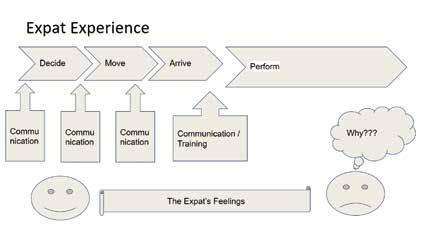
8 minute read
Enhancing The Expat Experience - A Deep Psychology Approach
“Lifestyle Expats” Have Different Challenges As I explained in previous editions of “The Global Mobility Workbook”, we see a new breed of expats who move from country to country. This is generally because they grew up as Third-Culture Kids already, or their spouse is offered a job in another country and they tag along and still wish to have a career, or they are simply from a generation who feel entitled to an international experience as part of their early-career experience. I call them “Lifestyle Expats,” also sometimes referred to as “Self-Initiated Expats” (SIEs).
They Underestimate The Effect Of Culture While we emphasize the importance for expats to learn about Swiss culture and to assimilate with the locals, we need to shoulder some of the responsibility as well. Granted, we cannot control what sort of neighbours expats will find, nor can we change all neighbours! However, is there any point of expats learning to integrate and still facing issues despite fitting in or blending perfectly, simply because the locals did not join intercultural training?
We need to start with ourselves and raise our “global competency”. “Global Competency” is a model I developed for “The Global Mobility Workbook” as well.
We need to understand the little nuances, for instance how the word “service” has a different expectation for people from China, India or Brazil than for Swiss people or anyone from a European background. The demographics of Global Mobility are changing. We can expect from diversity of culture and backgrounds from expats - more dual career couples, more female expats, more same sex couples, more patchwork families. Only by learning things like this, can we understand how to serve expats from other backgrounds in a better way.
What Does This Mean For Global Mobility? Basically, we are moving away from policies and focusing on individual offers and value propositions. The objective here is to provide better service while keeping the cost at the same levels. According to KPMG 2019 GAPP Survey, many organisations are already offering greater flexibility in their assignment policy approaches, allowing expats to benefit from more personalised packages. For example, we could say we have a budget we need to adhere to so we could provide spousal support but maybe the expat does not get support with the move. Or, we provide expat children with schooling, but they have to tackle housing on their own.
We could also allow the expat more control over what type of service they would like instead of either/or scenarios. Essentially, if we really want to enhance the expat experience (XX), our policies need to be geared more towards the individual. We are expecting that the scope of Global Mobility will be changing as more international hires and more international permanent transfers come in. In the past, the classical departments that took are of international assignments only took care of that “thing”.
When we talk about Global Mobility today, we mean departments that take care of all sorts of international movements, from business travellers to commuters, even digital nomads. In fact, digital nomads bring up interesting challenges. These are people who work through the internet and therefore theoretically could be working from anywhere. What would their home base be? And what implications would this have on their pensions? Digital nomadism seems to be particularly attractive among Millenials, but it is a phenomenon on the rise across generations, and it should therefore be given the right attention.
I feel that we also need to re-evaluate our definition of the word expat. In the Global Mobility Workbook, I talk about the “Lifestyle Expat”. Where is the difference with the term “Migrant” then? I would say migrants move to another country because they want to find work there. Their expectations are of a better lifestyle and better living conditions in the new country, and they often move on a permanent basis while they still care for family members in their home country. The term “Migrant” is considered to be a more general term but has a different connotation than “Expat”.
However, in some countries, the terms “Migrant” and “Expat” are used interchangeably. We should be open to this too, an expat is not someone who is just being moved by a company with a fat package. They could also be migrants or lifestyle expats who move on local contracts.
What we can do as service providers in this situation is to support global recruiting and talent acquisition. We could improve the experience for lifestyle expats by addressing some of the issues they face, such as issues with the immigration process, medical insurance, employment retention, language barriers and cultural adjustment.
Is Expat Experience (XX) The Same As User Experience (UX)? A recent survey by AIRINC found that 63% companies are currently working on enhancing the employee experience, ranked top strategic priority by the mobility professionals who took part in a 2019 Deloitte survey, indicating that this is indeed a very prominent topic in Global Mobility. Let me call it “Expat Experience” for our purposes. “Expat Experience” is more than just a case of user experience. There are several components to it. As we start to develop the idea of the Expat Experience, I think we should focus on five components: 1. The service expats receive at touch points 2. The cultural adjustment process 3. The learning journey 4. The “Deeper Expat Experience” 5. The communication hole.
The Service At Certain Touch Points While observing the interactions at touch points can help measure service quality, this is only one side of the coin. I think we fail to understand here that global couples aren’t robots. We cannot just send them through a move, open a bank account, help them sign a lease and expect them to be happy.
The Cultural Adjustment Process Academics usually focus on the cultural adjustment process. They try to understand how expats adjust to their new surroundings and how it relates to their performance. It is commonly known that in the first six months expats generally don’t perform as well as in their home country due to the adjustment period and cultural transition. In the normal adjustment period curve, there is a phase where the adjustment almost always leads to psychological mood swings and symptoms close to depression - this is commonly referred to as “culture shock”.
The Communication Hole In contrast, what we do in Global Mobility is that we focus on communicating with expats
during the initial phases of the assignment (decision, move and arrival). When they have moved to the country, we sometimes provide intercultural training, help with settling in and then we expect them to handle the next steps on their own. Here, expats often discover the true value of their packages. The spendable income might be eaten up by daily necessities, medical expenses and lunch money. The commute to work might take longer than expected, and the next person in the grocery line already shouted at them as they did not follow the protocol correctly.
Essentially, right when they need our support to keep them delivering high performance, we leave them alone.
The Learning Journey That, I believe, is actually an issue we could address quite easily. Why? Assume that an expat has already gone through a tough
The five components of the Expat Experience

phase - the family isn’t happy, they are all experiencing culture shock, the expat’s performance is low. They’re all out of their comfort zone and are in fact in a panic zone. Simultaneously, they are also experiencing what it means to be alone because of the loss of their support network from back home.
Here we could help by providing support in small, incremental steps and by listening to the expat couple and their needs.
The Deeper Expat Experience The deeper expat experience that I alluded to earlier is something many of us don’t know about. Perhaps you have heard of the famous Swiss psychologist Carl Gustav Jung?
He talked about how we often reflect our “shadows” in another person. Being in a different culture could also make you reflect yourself in the people of the host culture.
After the “honeymoon phase” for a while your reflection is negative - you will see things in other people you do not like about yourself. And you might not overcome this phase easily if you don’t discuss it with a professional coach. I think we still underestimate the consequences of the Expat Experience on our psyche: Expatriation is a deep experience. You meet your core, the essence of who you are and who you could be, a true journey of self-discovery.
In my view our higher purpose is to bring the human touch back into Global Mobility or as I said in my talk:
“The higher purpose of Global Mobility professionals is to help Expat Couples discover themselves, guide them through the challenges and be there for them when they go through the valley of tears.”
Fig. 1 - Nine Phases and Cultural Transitions (The Global Mobility Workbook, 2019)


ANGIE WEINBERGER Angie is the Global Mobility Coach. Angie always worked in International Human Resources specializing in Global Mobility. She owns a coaching and training company for expats and their spouses. She also works with GM Professionals and teams. Angie is the author of ‘The Global Career Workbook’, a self-help career guide for internationally mobile professionals and ‘The Global Mobility Workbook’. She is a lecturer in the Global Mobility field.










